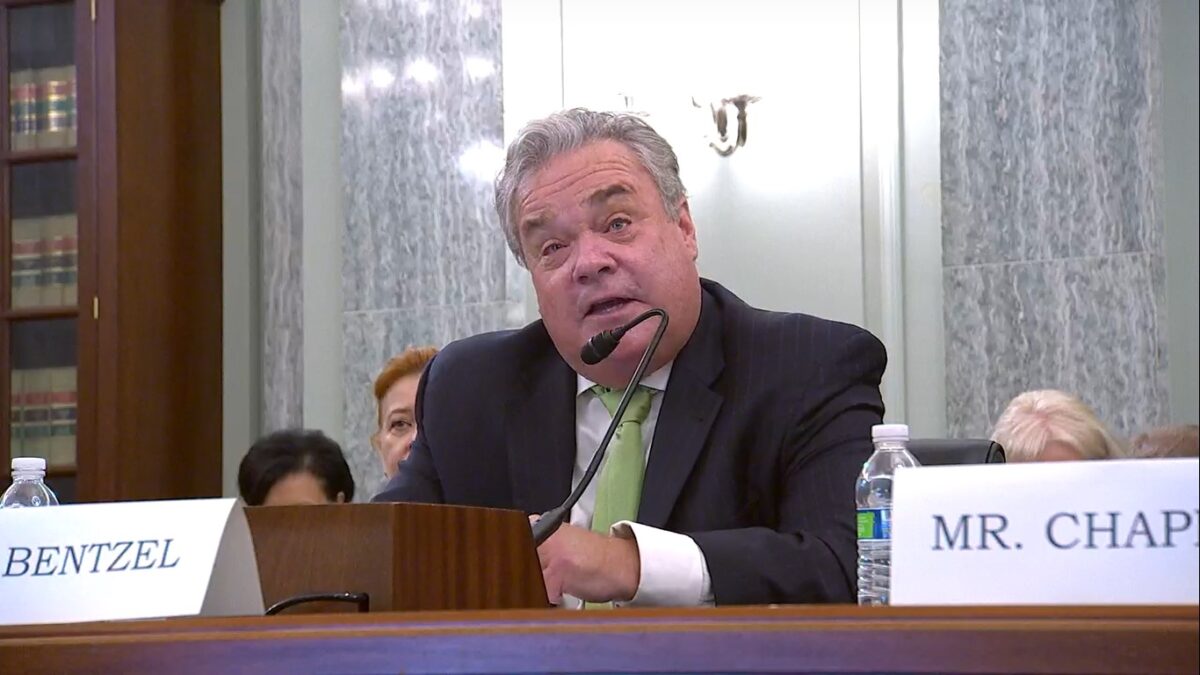WASHINGTON — A member of the Federal Maritime Commission told Congress he is concerned about the potential for a work stoppage at the nation’s East and Gulf Coast container ports as the countdown to a strike hits six days.
Commissioner Carl Bentzel told lawmakers Wednesday that while his agency is “immunized” from the collective bargaining process, the FMC is providing advice to shippers in case the International Longshoremen’s Association calls a strike next week.

“It is a huge economic concern. It worries me because of the volume of trade that our economy needs and relies on,” Bentzel told members of the Senate Commerce Committee during a hearing on his renomination to the agency. “I’m hopeful that they’ll get an agreement and not go into a work dispute.”
The U.S. East Coast and Gulf Coast ports handle billions of dollars in trade monthly and about 43% of all U.S. imports, according to ITS Logistics. Import levels, meanwhile, are being affected by the potential for a strike.
“This has caused some cargo owners to bring forward shipments, bumping up June-through-September imports, Ben Hackett, founder of Hackett Associates, which tracks container imports for the National Retail Federation, commented in a recent update.
“In addition, some importers are weighing the decision to bring forward some goods, particularly from China, that could be impacted by rising tariffs following the election.”
Asked about how current tensions compare with past disputes between dockworkers and terminal operators, Bentzel said West Coast negotiations have tended to be more contentious.
However, in the current East Coast standoff, “the ocean carriers had incredible profits during the pandemic and the labor union [did not have] a rate structure that reflected that, so they’re far apart on wages,” he said.
Bentzel told the committee that shipping customers “still have rights and protections” in the event of a strike, noting that the FMC this week reminded shippers, freight brokers, drayage companies and other port customers that it will monitor ocean carrier practices for Shipping Act violations – particularly as it pertains to container storage fees and late fees – in the event of a strike.
“Demurrage, detention, and all other fees and surcharges must be reasonable, clearly defined, and serve a specific measurable purpose,” the agency stated in a notice.
“The Commission is directing its Bureau of Enforcement, Investigations, and Compliance to investigate any reports of unlawful conduct of regulated entities. The FMC will prosecute violators to the fullest extent of the law.”
Shippers and other customers who believe they may have been subject to unlawful policies or fees have several options to report violations to the FMC, the agency stressed, including:
- Filing a complaint proceeding for adjudication before the FMC’s Office of Administrative Law Judges.
- Submitting a charge complaint requesting refund of waiver of an erroneous or unlawful charge assessed by a common carrier for rapid review by the commission.
- Requesting informal assistance to resolve a dispute with the commission’s Office of Consumer Affairs and Dispute Resolution Services. CADRS will try to quickly resolve disputes between shippers and ocean carriers or terminal operators through a voluntary resolution as opposed to an order issued in a legal proceeding.
- Reporting allegations of violations with the commission’s Bureau of Enforcement, Investigations, and Compliance, which could lead to a formal investigation.








TJ
“…billions of dollars in trade monthly”. Appreciate the detailed insights.
US Import levels are increasing. YTD up 4.5%(+$102.1 billion).
Container import volume in handled TEU comparing top 5 USEC ports vs. top 5 USWC ports for July 2024 show USEC/Gulf 41.3% and USWC at 45.5% share of total US imports.
Source: Descartes Datamyne
US Trade in Goods (Real U.S. Trade in Petroleum and Non-Petroleum Products by End-Use)
July 2024 Real exports of goods decreased $1.7 billion, or 1.2 percent, to $144.4 billion
July 2024 Real imports of goods increased $4.6 billion, or 1.9 percent, to $242.0 billion
Source: US Census report exhibit 11
Canada and Mexico account for USD 56.4 billion in exports (33.4%), and USD 77.7 billion in imports (26.7) in July 2024
Source: Census.gov exhibit 14
Suggest providing a source that reaches beyond a single link in the supply chain. No mention of container carrier advisories on cargo acceptance changes at inland rail/ramps, cut-off date changes, vessel port omissions, demurrage & detention calculation exceptions, etc. No information noted on extended terminal operations till Sept. 30th.
Those are valuable insights that any carrier, freight forwarder, or rail operator can provide. Although I am sure all these companies are busier assisting their customers and coordinating solutions e.g. airfreight. Keep an eye on their advisory updates and live tickers to get a direct insight into the situation.
The internet is flooded with articles which generalize and speculate.